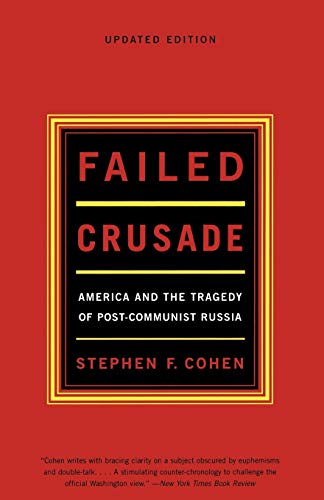Failed Crusade
America and the Tragedy of Post-Communist Russia
Stephen F. Cohen Ph.D.
BOOK REVIEW

The Failed Crusade: America and the Tragedy of Post-Communist Russia by Stephen F. Cohen is not merely a book; it's a clarion call to anyone who dares to understand the complexities shrouding the geopolitical landscape post-Cold War. Published in 2001, Cohen-a highly respected scholar and historian-unveils a narrative drenched in the struggles and triumphs of a Russia in transition, a tale that is nothing short of tragic.
One of the most striking elements of Cohen's work is how he intertwines the fate of ordinary Russians with the machinations of American foreign policy. This is not just a critique; it's a heartfelt examination of what happens when a country, once shrouded in opulence and power within the Soviet realm, is left to navigate the turbulent waters of democracy and capitalism without a compass. Cohen doesn't shy away from the emotional ramifications of this era, which he expertly illustrates through vivid storytelling that engulfs you in the rawness of frustration and sorrow felt by the Russian populace.
You can almost hear the echo of despair resonating through the pages as Cohen dismantles the notion that post-communism would usher in a golden age for Russia. Instead, he paints a grim portrait of economic hardship, political disillusionment, and societal upheaval. The optimism of Western nations-the "crusade" that lay in envisioning a prosperous Russia-has been met with a disheartening reality. The author compels you to ask: how could such hope morph into such disillusionment?
Cohen's lens extends beyond mere analysis; it serves as a reflection. As you turn each page, you grapple with the ghosts of missed opportunities and the colossal blunders of U.S. interventionism. The critiques of American policymakers echo-a pervasive sense of betrayal that lingers like a specter haunting the corridors of history. He urges you to confront uncomfortable truths, challenging the narrative that American goodwill could magically solve complex historical grievances.
Critics have noted that Cohen's passionate viewpoint, while informative, sometimes strays into territory that feels sympathetic to Russia's plight. This has led some readers to question whether his analysis sacrifices objectivity on the altar of emotional resonance. However, this intense passion is precisely where the book thrives. It beckons you to confront your own judgments, to ponder the moral dilemmas faced in diplomacy.
The voices of readers reflect a polarization in their reactions. Some laud him for his bravery in tackling such weighty themes, particularly when discussing Russia's struggles through the lens of its leaders and citizens alike. Others criticize him for lacking a sufficient critique of Russia's own choices during this turbulent period. Yet, this dichotomy enhances the book's allure-it leaves you imbued with a contemplative fervor, pondering where you stand in this complex geopolitical narrative.
Given the historical context, Cohen's examination is eerily prescient, his observations resonating with today's diplomatic challenges. In a world that continues to grapple with the repercussions of foreign intervention, economic crises, and the quest for democratic ideals, Failed Crusade becomes essential reading. The echoes of its warnings still reverberate: the delicate fabric of nations is not easily stitched together, especially when rife with sorrow, loss, and the scars of past conflicts.
As readers delve into the emotions layered within this text, they find themselves not just passive observers but active participants in a global dialogue. What makes Cohen's work stand out is his unyielding commitment to bringing forth the human experience in the midst of geopolitical strategies. It's a stark reminder that behind policies, there reside people who are profoundly affected by the decisions made from seats of power.
Thus, the Failed Crusade is more than an academic treatise; it serves as a poignant exploration of ideals and realities. It thrusts you into the heart of a tragedy that transcends borders and ideologies, forcing you to confront your understanding of freedom, complicity, and the quest for a better tomorrow. 🌍
Take this as an invitation, a challenge even: engage deeply with this text and allow it to reshape your perspective on history, compassion, and the burdens of nations. The pain of post-communist Russia is but a reflection of our collective struggles-an articulation that urges us to think critically about our own roles in an ever-evolving global narrative. Are you ready to unravel the tangled threads of diplomacy that bind our fates together?
📖 Failed Crusade: America and the Tragedy of Post-Communist Russia
✍ by Stephen F. Cohen Ph.D.
🧾 366 pages
2001
#failed #crusade #america #tragedy #post #communist #russia #stephen #cohen #phd #StephenFCohenPhD